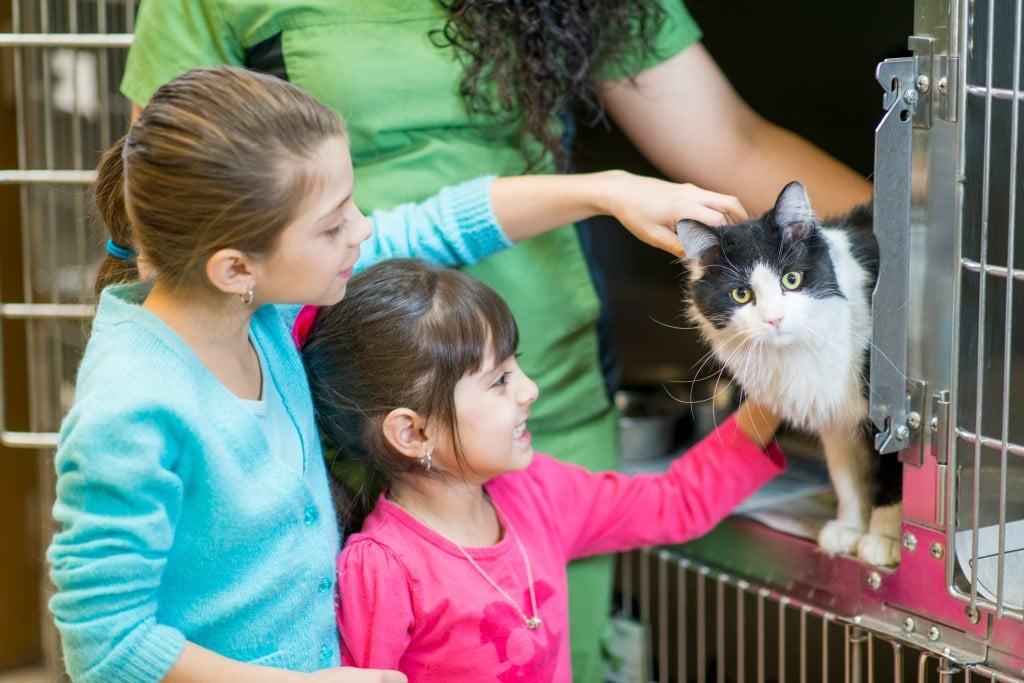Table of Contents
Adding a new pet to your family can sometimes feel like a bit of a gamble. After all, you’re often provided with only a limited view into the pet’s temperament and medical history. As tempting as it may be to bring home the first pet that you fall head-over-heels in love with, it’s important to conduct an honest appraisal of the pet’s health. The last thing you want to do is bring home a new puppy or kitten, become attached to that pet, and then find out that your pet has a serious illness.
First, Evaluate the Rescue Organization
Whether you’re obtaining a pet from a county animal shelter or a small, private rescue group, it’s important to carefully evaluate the organization and their facility.
As you tour the facility, look around carefully and talk to individuals who are working there. Consider the following questions:
- Is the facility clean?
- Do the animals appear to be well-cared for?
- Do the staff/volunteers interact with the pets in a positive way?
- Does the facility conduct some sort of screening or interview before adopting out their pets, to help increase the chances of a good match?
Ensure that the facility provides appropriate veterinary care for their pets. All rescue pets should receive a veterinary exam, deworming, vaccinations, diagnostic testing, and treatment for any medical conditions that may be apparent. All of this information should be documented in each pet’s medical record; these records should be given to new owners at the time of adoption. A lack of veterinary care or vague medical records can be a red flag, suggesting that your prospective pet’s medical needs have not been met.
Next, Evaluate a Specific Pet
While some diseases require complex veterinary diagnostics to discover, a brief once-over can go a long way in helping you select a healthy dog or cat for adoption.
When you find a pet that piques your interest, spend some time interacting with them and observing them closely. Make note of the following:
- Is the pet at a healthy weight? Ribs should not be visible from a distance.
- Is the pet curious and willing to interact with strangers?
- Does the pet eat readily when offered treats? (Do not offer any treats without asking the permission of the shelter or rescue group.)
- Can the pet see and hear normally?
- Does the pet move around its environment comfortably, without any signs of limping or stiffness?
- Is the pet active and able to play without excessive signs of fatigue?
Once you and the pet have become comfortable with each other, you are ready to do a more hands-on examination. Look over the pet carefully, working your way from nose to tail:
- Teeth: Are the teeth relatively clean? Are the gums a healthy pink color?
- Eyes: Are the eyes clear and free of discharge?
- Ears: Are the ears clean and free of discharge?
- Coat: Does the pet have a healthy, unmatted coat that is free of parasites?
- Skin: Is the skin free of visible inflammation and tumors?
If you make it through this examination without noticing any problems (more on those below!) there is a relatively good chance that your prospective pet is free of major health problems.

Potential Red Flags
As you examine your prospective pet, keep an eye out for these potential red flags:
- Severe dental tartar or bad breath
- Red/inflamed gums
- Pale gums
- Blindness
- Cloudy or inflamed eyes
- Deafness
- Heavy or stinky discharge within the ears
- Vomiting
- Diarrhea
- Lack of appetite
- Hair loss or dull coat
- Fleas or visible “flea dirt” (flea feces) in the coat
- Red or itchy skin
- Skin tumors
- Limping
- Pain when touched
- Poor body condition (overweight, underweight)
- Lethargy (low energy)
Observing any of these red flags suggests that your prospective pet may have an underlying health problem. While some medical problems can be easily treated, others are far more complex to address. And, contagious medical conditions may be transmissible to you and to other pets in your home. Adopting a healthy pet is the best way to minimize the risk of immediate veterinary expenses or a potential serious medical condition.
After Adoption, Schedule a Veterinary Exam ASAP!
Even if your pet appears completely health, a thorough veterinary examination should be your first priority for your newly-adopted pet.
In addition to a physical examination, your veterinarian will recommend appropriate diagnostic testing for your new pet. Depending on your pet’s species and age, these tests may include fecal parasite testing, heartworm testing, and feline leukemia/feline immunodeficiency virus testing.
A prompt veterinary exam is essential for several reasons. First, many medical conditions are easily treatable. Early treatment allows your new pet to feel better quickly and can reduce the risk of disease transmission to your human and four-legged family members. Additionally, a prompt veterinary exam will provide you with valuable information regarding your pet’s health status. If your new pet has a condition that you will be unable to care for, you may be able to return them to the rescue group before making a tremendous emotional and financial investment. Giving up a newly-adopted pet is never easy, but this decision only becomes more difficult as time elapses.
Your veterinarian can also serve as an excellent resource for information on nutrition, training, socialization, and other aspects of pet ownership.
Summary
Don’t get distracted by an adorable set of puppy-dog eyes or sweet kitten purrs! Instead, remain level-headed when adopting a new pet.
Conduct an honest appraisal of both the rescue organization and the specific pet in which you’re interested. Careful observation and brief hands-on inspection can increase the likelihood of adopting a healthy pet that will enjoy a long, happy life with your family.







